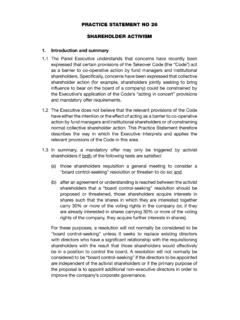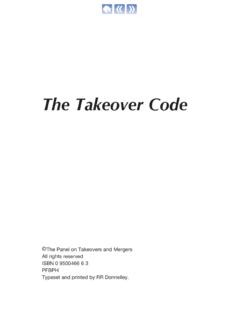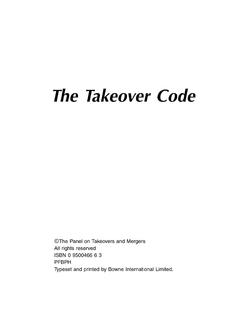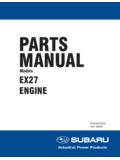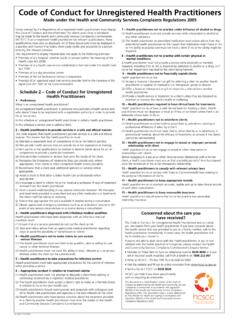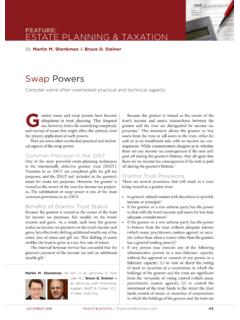Transcription of THE TAKEOVER PANEL SCHEMES OF ARRANGEMENT …
1 RS 2007/1 Issued on 29 November 2007 THE TAKEOVER PANEL SCHEMES OF ARRANGEMENT STATEMENT BY THE code COMMITTEE OF THE PANEL FOLLOWING THE EXTERNAL CONSULTATION PROCESS ON PCP 2007/1 CONTENTS Page Introduction and overview 2 2. Definitions and interpretation 13 3. Timing issues (Rules 30 and 31) 22 4.
2 Announcements following key events in a scheme 33 5. Competition references (Rule 12) 36 6. Holding statements (Note 1 on Rule ) 40 7. Revision (Rule 32) 42 8. Competitive situations (Rule ) 46 9. Switching 50 10. Alternative consideration and withdrawal rights (Rules 33 and 34) 55 11. Mandatory offers (Rule 9) 60 12. Appropriate offers or proposals and comparable offers (Rules 15 and 14) 64 13. Voting by an exempt principal trader (Rules and ) 67 14. Financial information and documents on display (Rules and 26) 69 15.
3 Formula offers (Appendix 2) 72 16. Disapplied provisions 73 APPENDIX A Amendments to the code (including the SCHEMES Appendix) 74 APPENDIX B Non-confidential respondents 96 21. Introduction and overview (a) The consultation in relation to SCHEMES of ARRANGEMENT This Response Statement provides details of the response of the code Committee of the TAKEOVER PANEL (the code Committee ) to the external consultation process on the proposals in PCP 2007/1 (the PCP ) issued by the code Committee on 11 June 2007.
4 In summary, the PCP proposed a number of amendments to the TAKEOVER code (the code ) as it applies to a transaction regulated by the code which is implemented by way of a scheme of ARRANGEMENT . The aim of the proposals in the PCP was to codify the practices developed by the PANEL Executive in relation to the application of certain provisions of the code to such SCHEMES . Having considered a number of possible ways of making the application of the code to such SCHEMES more transparent and certain, the code Committee concluded that the best approach would be to amend the code in the following ways: (a) by introducing a new Appendix into the code in relation to SCHEMES (the SCHEMES Appendix ); (b) where necessary, by amending the existing provisions of the code .
5 And (c) by introducing into the SCHEMES Appendix a list of provisions of the code which should be disapplied in the context of a scheme of ARRANGEMENT (the List of Disapplied Provisions ). (b) Responses to the consultation Fifteen responses to the PCP were received. Seven respondents made only general comments or responded only to a very limited number of questions whilst the remaining eight made more detailed comments and/or responded to most or all of the questions. The code Committee thanks all of the respondents for their comments.
6 3 Eleven of the respondents submitted their comments on a non-confidential basis. A list of non-confidential respondents can be found at Appendix B to this Response Statement. Generally, the respondents welcomed the codification of the PANEL Executive s existing practices in relation to the application of the code to SCHEMES of ARRANGEMENT , which they hoped would provide increased certainty of approach in this area. The respondents also welcomed the proposed approach to amending the code , which they considered would provide an appropriate balance between transparency and maintaining the current structure of the code .
7 Respondents had significant conflicts of view in relation to: (a) the timetable which should apply to a scheme of ARRANGEMENT ; (b) whether a person should be permitted to satisfy a mandatory offer obligation under Rule 9 of the code by way of a scheme of ARRANGEMENT ; and (c) the circumstances in which an exempt principal trader connected with an offeror or the offeree company should be permitted to vote on a resolution to approve or give effect to a scheme of ARRANGEMENT . The respondents views on these issues, and the code Committee s response to them, are addressed in sections 3, 11 and 13 respectively of this Response Statement.
8 Respondents also raised issues in relation to three areas which were not addressed in detail in the PCP, namely: (i) SCHEMES which do not have the support of the offeree board; (ii) the granting by the PANEL of derogations and waivers; and (iii) the lapsing and withdrawal of SCHEMES and the ending of offer periods. The code Committee considers these issues in paragraphs to 4(c) The code Committee s conclusions In the light of the responses received, the code Committee has largely adopted the proposals made in the PCP.
9 However, the code Committee has made a number of modifications and improvements to certain of the proposals as a result of respondents comments and suggestions, as described in this Response Statement. The code Committee believes that the amendments set out in this Response Statement constitute proportionate measures for improving transparency and certainty regarding the application of the code to SCHEMES of ARRANGEMENT . The code Committee considers that the amendments will be of benefit to practitioners, parties to SCHEMES and other market participants and that they will not have significant cost implications.
10 (d) SCHEMES which do not have the support of the offeree board Two respondents noted that the amendments proposed in the PCP were based on the assumption that a scheme of ARRANGEMENT would be recommended by the offeree board. The code Committee acknowledges this. The respondents considered that, as a matter of law, it would be incorrect to say that a scheme could not be used to effect a hostile TAKEOVER and suggested that the code should include a requirement for a person that is considering implementing a hostile offer by way of a scheme to consult the PANEL .
